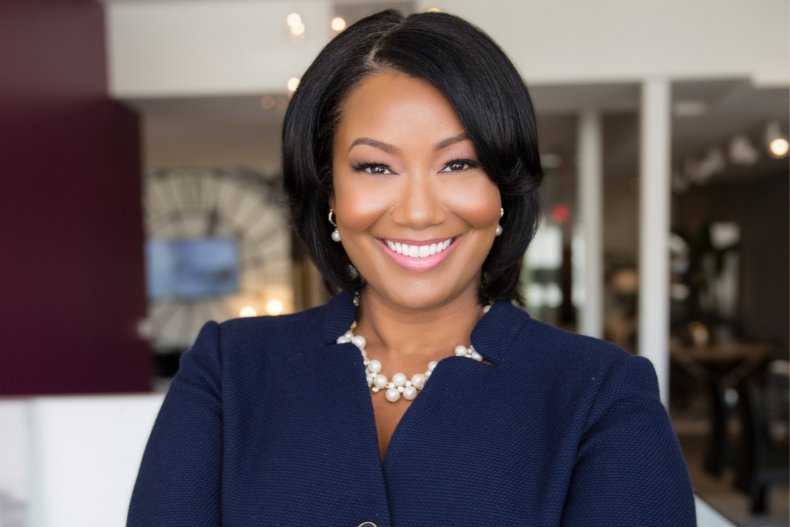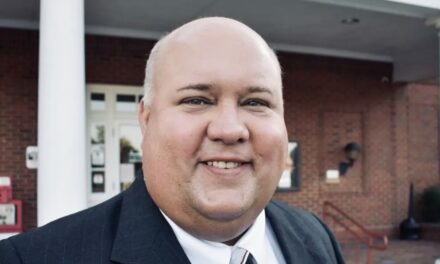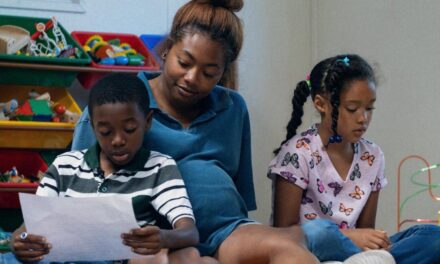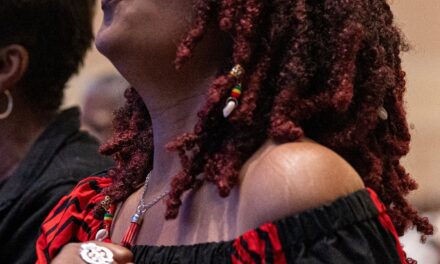“We should all go to the Wild at Heart Men’s Conference together!”
Jackson, once a pastor and former Boy Scouts troop leader, stood at attention at the head of the table, holding up a handful of glossy brochures about the conference. He scanned the other faces, nodding in either consideration or in agreement with the idea.
Except his eyes never met mine.
Out of the six of us, I was the only woman and person of color in the room.
A wisp of coldness blew through me.
“This could be our team bonding trip for next year!” Jackson continued. “We’ll be up in the Colorado mountains—go hiking and camping—and there’ll be great leadership development. We’ll have fun and come back better as husbands and fathers… and leaders.”
“Yeah, Jackson, that’s a great idea!” declared Duke, another teammate. A couple of men dropped their mouths and raised their eyebrows at Duke, who typically projected an air that great ideas could only come from him. But everyone knew Duke loved anything involving the outdoors, rifles, and water. He often bragged about his hunting trips.
The idea thrilled me, too. I had never been to Colorado before, nor many places, for that matter. My heart filled with excitement at the possibility of experiencing the majestic beauty I only knew from magazines.
But Jackson said it was a men’s retreat.

Juliet Hall
My head slowly fell as I attempted to conceal my furrowed brows. I sat motionless in my chair while a different kind of awkwardness swelled inside me.
It was the sort of uneasiness anyone might feel if expected to intelligently respond to a question without fully having all the information—and not knowing where the other person was coming from. All I knew to do was smile. Just smile. Whenever in doubt, that was my first step in getting through awkward situations while disarming the adversary.
The only problem was, at the moment, my usual winning smile was nowhere to be found.
It was my first fall planning retreat with my team. I was somewhere in North Georgia on the rustic grounds of a tucked-away lodge and conference center. I was excited to experience a real retreat instead of being locked inside a bland meeting room all day. A glorious canvas of burnt orange and honey-colored trees serenaded the facilities—a far cry from the noisy, dusty basement I knew at the bank.
After leaving the bank a little over a year ago, I had grasped the promise of a dream career with a growing company that took me six months and fourteen interviews to land. I pranced in this new world of employment, where teams traveled to adventurous places and called it work.
The agenda item up for discussion now was what activities we were going to do together to build and bond our team for the upcoming 2001 calendar year.
Here I was, excited that I had “arrived”—until this moment. The room’s brightness shaded into a soft gray, and I suddenly grew numb. The idea of my attending a men’s conference, as a woman, somehow didn’t sit too well with me. No energy was directed my way, however, not even a slight acknowledgment of my presence.
As the newest consultant on the team, I wanted so badly to fit in, be accepted, and just be “one of the boys.” But how could I, a twenty-something-year-old Black woman, fit in with a homogenous display of older White men whose average age was forty?
I fidgeted in my seat, wrestling with this idea. But I wanted them to like me. I swallowed a deep breath, cleared my throat, and decided to go along.
“I guess it could be good…um…for me, too—to attend a men’s conference.” My lone, tremulous voice found its way into the conversation. “It might help me to understand men better, to learn how men communicate…you know…how you guys think….”
Suddenly, there was silence.
It was the first time I’d spoken up. I glanced around the table with a nervous smile. Rapid heartbeats pounded through my chest. All I got back in return were averted glances, though I noticed a few exchanged uneasy looks with each other. Duke rolled his eyes.
But Jackson was as unmoved as his stiff, gelled silvery hair. The lines etched in his forehead didn’t bend when he finally looked at me.
“Oh…you can’t go,” he said, without blinking an eye. He stood erect at the head of the conference table as if he were commander in chief, even though in reality we were all teammates. “It’s a men’s conference…for men only. Women aren’t allowed.”
My lips pursed at his response while my eyes grew in horrific disbelief. I shifted my gaze toward the windows, where the trees seemingly hunched together in sorrow for me. Leaves dropped incessantly like tears. I gulped so loudly that it could be heard a mile away.
“I’m sorry, but you can’t go,” he repeated with cool, unwavering poise, as if I were out of order for thinking I could.
“So, then, a team outing…without Juliet?” I shot back.
I’m not sure where I got the courage to challenge Jackson. But I sat firmly in my chair, unapologetically, in a stare-down contest with him.
A tense silence permeated the room. No one moved. A couple of eyes lowered while others whispered, “Oh, damn!”
Had I just spiraled into The Twilight Zone? It was as if my entire world were brought into a black-and-white throwback of the 1950s, when a “Whites only” sign could have been easily posted on the conference room door.
“Let’s take a fifteen-minute break!” interjected T.J., another one of my teammates. He was the team’s peacekeeper and quiet sage.
“Yep!” Most of the consultants eagerly complied. Immediately, they scrambled out of their chairs and scattered in different directions, while Jackson smacked the glossy brochures on the table.
I, too, hopped out of my seat and dashed to the ladies’ lounge. My heart raced with either panic or anger—I was not sure which. Shaking, I hid myself inside the farthest empty bathroom stall and locked it. I struggled to find my next breath.
A lump formed in my throat as I pressed my head against the stall door. With muffled sobs, I squeezed my eyes shut and wrapped my arms tightly around my chest. Wet lines began to streak down my soft brown face. This was my first bathroom moment.
Training was over. There was no more euphoria about being a new hire with this company. The smiles and warm hellos I experienced in my interviews now seemed as artificial as the mannequins in a store window. Behind closed doors breathed something extremely peculiar, unlike anything I had ever experienced in my young career—or life.
I didn’t see this one coming. Or, did I?
I reflected on the stats I knew. Here we were, in Y2K, and there were no women or people of color on the executive committee.
That should have been a hint. There were other hints, too, of this new Goliath. I was the only person of color in my training class of twenty-two people or so. It wasn’t long before the curious opposition targeted me.
“How are you, a Black woman, going to work with us White men?” a guy in my training class asked me, scratching his bushy head. He wasn’t mean or malicious—actually, he was a gregarious personality who strutted around in class like a self-proclaimed statesman—but his question still pierced my heart like an arrow. I was shocked into silence, not knowing what to say, while a few of my classmates within earshot lowered their heads.
On another occasion, a lean elderly man approached me in the building atrium as I was headed toward the dining hall for lunch. I wasn’t sure which department he worked in, but I saw him often around the building. His eyes always seemed to follow me. I greeted him nervously as he stopped in front of me, blocking my path to the lunch line with a questioning look.
“You know, Juliet, I look at you…and I just wonder…” He tilted his head and narrowed his eyes before continuing in his sharp country twang. “I think ’bout Carla—she can challenge men. Then there’s Vicki…she’ll do alright, I reckon. But you, I just see…a great big smile.”
I wasn’t smiling at the moment.
“I’m wondering…can you really challenge and help men lead their work? Hmm?”
A burn raked through me. I didn’t know what I resented more—his shallow assumptions of me or the fact that he was emboldened to share them. I wondered how he might have felt if a random person, who knew very little about him, stopped him in his tracks to say, “Hey, dude…I don’t think you have the balls to do your job!”
Of course, I could never say that. My young body froze as I looked up into the squinted eyes of this graying man. I swallowed hard before flashing him a wry smile.
“Well,” I said softly, “first of all, I’m not Carla—nor Vicki. And secondly, I interviewed with a lot of people to get here. My leader believes in me—he thinks I can do this job. And his boss, the senior vice president, supports me, too. So, if they think I can do this job, then I think I’ll be just fine!”
A slight brush of red painted his leathered face. He darted his eyes across me, and after a slight scoff, he left.
This is an extract from Chapter 4 of Own Your Opportunities: A Story of Self-Discovery and Self-Determination by Juliet Hall, published by Post Hill Press.
Juliet Hall is the principal of Juliet Hall INC, a boutique leadership consulting agency based in Atlanta, and is recognized by several organizations in Atlanta as a “Top Black Woman of Influence.”
All views expressed in this article are the author’s own.
Do you have a unique experience or personal story to share? Email the My Turn team at myturn@newsweek.com



